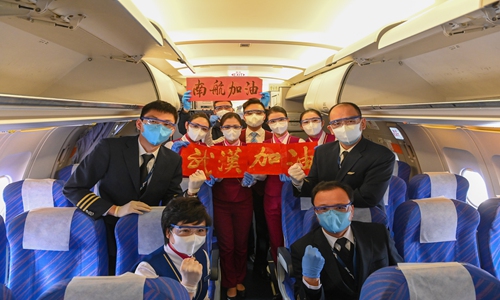
(Photo: CNSPhoto)
It has been eight consecutive days that the number of confirmed cases of the novel coronavirus-related pneumonia declined in areas outside of Central China's Hubei Province. It clearly shows the top-level preventive measures adopted across the country have taken effect and this severe epidemic has been put under control. Although experts are cautious in predicting an inflection point, we have seen some light. Chinese society has been striving for a turn in the situation under the leadership of the government.
Except for Hubei Province and some cities where the situation is still serious, inter-province and inter-city transportation has resumed. Airports and train stations in metropolises such as Beijing and Shanghai have become busy again and the subways are no longer empty as we saw a few days ago.
Preventive work in each area has not been relaxed. A complete management system has been set up and continues to improve in each city and county. Most residential communities implement strict lockdown measures. Those infected can be located very quickly, as well as people whom they had contacts with. A network has been formed to fight the novel coronavirus.
Under such circumstances, we think it is high time for countries which have imposed travel restrictions on their citizens to reconsider this measure. Hubei and its capital Wuhan as well as some cities in a severe situation have been locked down, and the number of newly infected cases in other places has been low.
When the World Health Organization (WHO) announced the outbreak of coronavirus in China a Public Health Emergency of International Concern, it did not recommend any travel or trade restrictions against China. This is based on the fact that the Chinese government has adopted strong and effective control measures. China has not failed the WHO's trust and it has achieved the strictest control over the virus.
Some countries have completely cut off traffic communications with China and even banned non-citizens who have been to China within last 14 days to enter their country. This is serious violation of WHO recommendations. As the situation has significantly relaxed in recent days, these countries should reconsider and revoke these practices.
China is the world's largest manufacturing factory, and one of the places with the largest human flow on the Earth. Canceling flight to and from China has made many airlines suffer huge losses, which also deals a heavy blow to the first-quarter performance of the world economy. If all the countries keep their measures unchanged, it means all sides will pay bigger cost from the epidemic.
The coronavirus, which was just named COVID-19 by the WHO, is harmful. But as long as necessary control measures are put into places, the actual harm it can cause is very limited. So far, in major Chinese cities like Beijing and Shanghai, the number of people who died from COVID-19 are mostly below 10. In Beijing, three people died from the virus as of Tuesday. But in the US, the influenza this year has caused far more deaths in major cities.
As China has made a lot of efforts and explorations to control COVID-19, it is completely irrational to implement inter-country isolation to prevent the spread of the disease. It is unscientific and also violates the interests of all countries.


